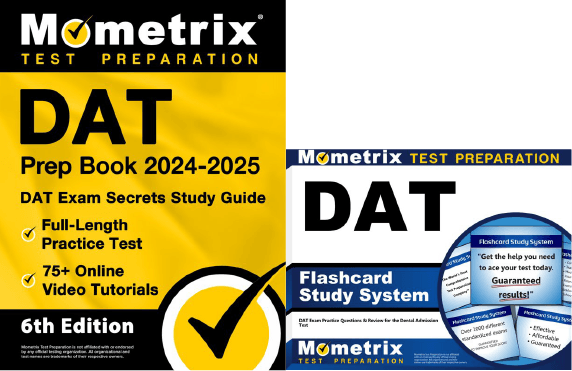If you need help studying for the Dental Admission Test (DAT) test or just want some more information about what the test is like, you’ve come to the right place.
Click below to take a free DAT practice test!
How to Register
DAT Test Scores
Retaking the Test
FAQs
Self-Assessment Modules
What’s on the DAT Test?
First, let’s talk about the questions on the exam. There are 280 multiple-choice questions total, but there are a handful of questions that won’t count toward your score. Why is that?
The unscored questions on the DAT test are “experimental” questions. These are added to the exam to determine if they’re good enough questions to add to future versions of the test.
The trick is that you won’t have any way of knowing which questions are scored and which ones are experimental. They will appear just like the scored questions throughout the test.
The time limit for the exam is 4 hours and 15 minutes, and you have the option to take a scheduled 30-minute break halfway through the exam. You’re free to take additional unscheduled breaks if you need to, but the timer will keep running.
Let’s take a closer look at the different sections of the DAT test.
SURVEY OF THE NATURAL SCIENCES
100 questions
40 questions
- Cell and molecular biology
- Diversity of life
- Structure and function of systems
- Genetics
- Evolution and ecology
30 questions
- Stoichiometry and general concepts
- Gases
- Liquids
- Solids
- Solutions
- Acids and bases
- Chemical equilibria
- Thermodynamics
- Thermochemistry
- Chemical kinetics
- Oxidation-reduction reactions
- Atomic and molecular structure
- Periodic properties
- Nuclear reactions
- Laboratory
Here’s the good news: you’ll be given a copy of the periodic table of elements for the general chemistry questions!
40 questions
- Mechanisms
- Chemical and physical properties of molecules
- Stereochemistry
- Nomenclature
- Individual reactions of the major fundamental groups and combinations of reactions to synthesize compounds
- Acid-base chemistry
- Aromatics
- Bonding
PERCEPTUAL ABILITY
90 questions
- Apertures
- View recognition
- Angle discrimination
- Paper folding
- Cube counting
- Spatial relations/3D form development
READING COMPREHENSION
50 questions
QUANTITATIVE REASONING
40 questions
The good news is that you can use a calculator for this section!
How to Register
To get started with the registration process, you’ll need to create a DENTPIN and submit an application on the ADA’s website.
A DENTPIN is a Dental Personal Identifier Number. This eight-digit number protects your personal information, similar to a social security number or your PIN for your debit card.
You can register for a DENTPIN via the ADA’s website. The good news is that it’s completely free!
When you submit the application, you’ll also need to submit the testing fee, which is $540.
Once your application has been sent and approved, you’ll be ready to schedule your testing appointment.
DAT Test Scores
The test is scored using a scaled scoring method. Here’s how it works:
For every question you answer correctly, you get one point added to your raw score. At the end of the test, your final raw score will be converted to a scaled score. This scaled score will range somewhere between 1 and 30. You will need a score of 240 to pass the test.
The reason your raw score is converted to a scaled score is because everyone who takes the test is given a slightly different set of questions. Since everyone has a different arrangement of questions, and because some questions are harder than others, converting your raw score to a scaled score ensures a more even playing field.
There is no set passing score for this test, but the average score is estimated to be a scaled score of 19.
Retaking the Test
If you didn’t get the score you wanted on your first try, that’s okay! After a 60-day waiting period, you can register to take the exam again.
FAQs
How many questions are on the DAT test?
There are 280 multiple-choice questions on the test.
How long is the DAT test?
The test is timed at 4 hours and 15 minutes.
What is a good DAT score?
A good score to aim for is a scaled score of 19.



 DAT Study Guide
DAT Study Guide DAT Flashcards
DAT Flashcards